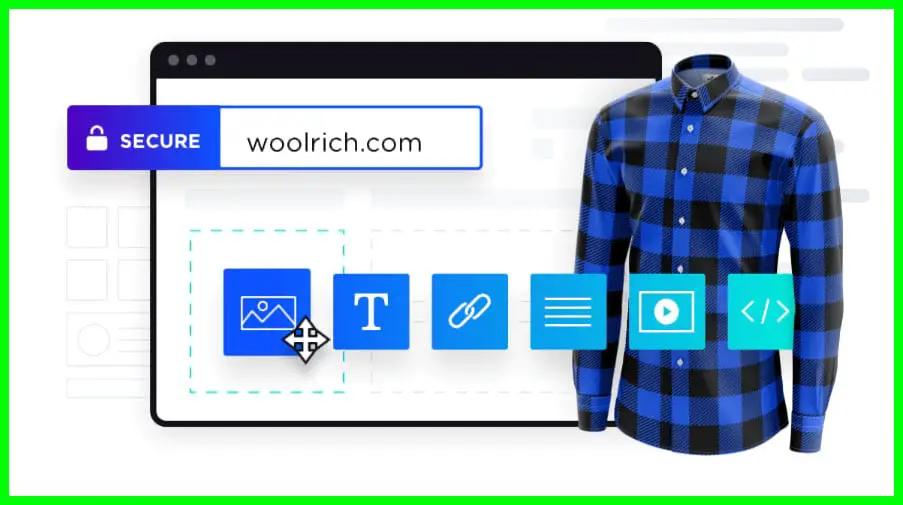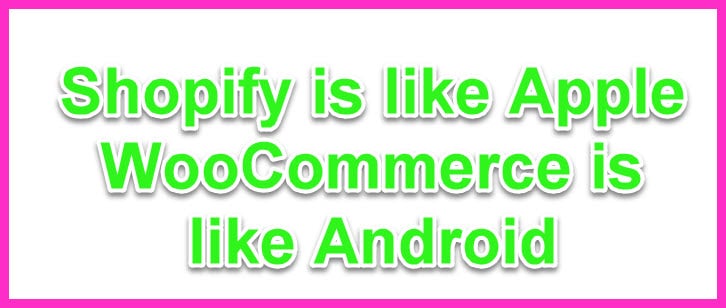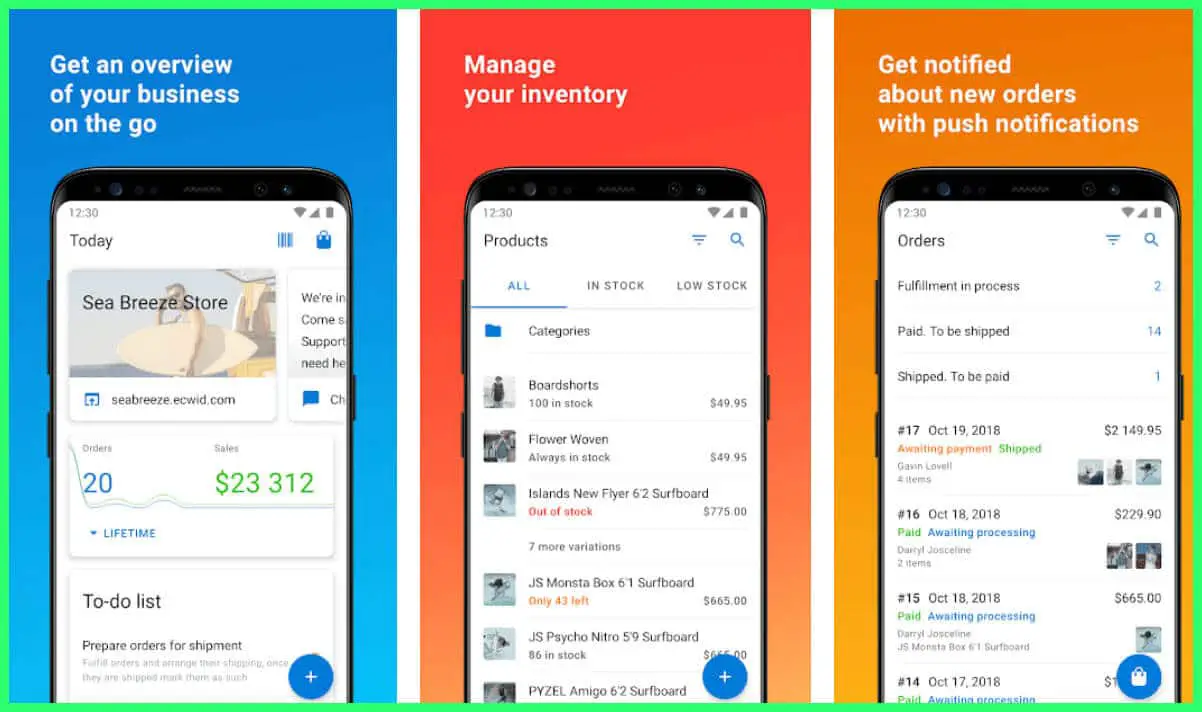Do you have a curiosity to know about the Best Alternatives of Shopify for your online store? 🤔
We collected 11 of the best ones for you in this list.
Let’s get started. 📗
Shopify is one of the excellent eCommerce software solutions available out there. It has grabbed huge popularity within a very short period. The platform allows individuals and businesses to build their eCommerce sites even if they do not know the “C” of coding.
It helps manage almost everything for the users starting from generating invoices and managing catalogs to payment processing and all the other things required for operating a successful online portal. The basic plans at Shopify generally cost $29, while the advanced plans cost $299.
Whether you are into selling only a few products such as stuffed toys or deal in everything fashion or lifestyle, Shopify will lend you a helping hand.
This platform makes way for the easy management of online stores while allowing users to extend their site functionality at the same time.
100+professional themes; automated calculation of shipping rates; making sales on Instagram and Facebook; 70+ payment gateways; 50+ translatable languages; search engine optimized; good speed; social media integration; mobile commerce ready.
unlimited bandwidth; unlimited products; provision of adding discount codes and product reviews; creating gift cards and using one’s own customized domain name are some of the most exclusive features of Shopify. It is not a one-size-fits-all service.
There are certain nuanced needs that it cannot accommodate. Fortunately, there are alternatives to Shopify available for filling the gaps left empty by the service. We will have a look at them below:
Best Alternatives of Shopify: Our Top Picks 👌
1. BigCommerce
It is one of the most direct and greatechnicalustad.competitors of Shopify. It gives its users the ability to create and customize their stores, selling on different channels, and controlling the entire eCommerce operations from just one place.
Just like Shopify, there are three basic plans offered by this platform. The standard package costs $29.95, $79.95 is the price of the Plus package, and then there is the Pro package priced at $249.95.
Features:-
- Inventory management
- Product variants and options
- SEO tools
- In-built blog
- One-page checkout
- Abandoned cart saver
- Free of cost in-house shipping attributes
- Store credit cards
- Free shipping
- Real-time quotes
- Tax calculations
- Sell on well-known social media and marketplaces
- Perfect for WordPress
Below is the summary of the main Pros and Cons of BigCommerce that earned it a spot in our list of the Best Alternatives of Shopify.
Pros:-
- The platform does not provide in-house payment processing. Nevertheless, it offers users the potential to integrate with more than 65 payment gateways. Also, there are no transaction fees charged apart from what the processors charge directly.
- Professional reports and gift cards are available with the $79 plan of Shopify, but BigCommerce offers these features in all its plans.
- Unrestricted staff accounts
- BigCommerce provides single-page checkout, which is a significant functionality for preventing cart abandonment. There is an add-on required for using this feature in Shopify.
- BigCommerce is easy to use, especially for the ones who are beginners in the field of eCommerce.
Cons:-
- Abandoned cart recovery tools are only available with the Plus plans of BigCommerce.
- BigCommerce plans come with a limit for online sales to be made every year. Such sales limits are not imposed in Shopify plans.
- The platform does not have several options, as offered by Shopify.
If you are on the lookout for a platform with out-of-the-box features, then BigCommerce would be the right option for you.
Click to download and install.
2. Magento
Introduced in 2008, Magento is an open-source, free shopping cart. It works best for large and mid-size vendors. Unlike Shopify, Magento can easily be downloaded and is not cloud-based.
It is a scalable, feature-rich, and powerful platform perfect for established companies looking to have complete control over their online portals. It even works for businesses with sufficient capital for paying for hosting requirements, security, and web design.
Though Magento itself is free to be downloaded, users will have to pay for web hosting, SSL certificate, domain names, add-ons, and payment processing.
Features:-
- Customer groups
- Coupons
- SEO Tools
- Cross-sell and up-sell
- One-page checkout
- In-built reporting features
- Digital products
- Bulk export and import
- Guest checkout
- Unrestricted product features
- Split orders
Below is the summary of the main Pros and Cons of the Magento that earned it a spot in our list of the Best Alternatives of Shopify.
Pros:-
- Great set of features
- Download is free
- The active universal user community
- Highly scalable
- Highly customizable
Cons:-
- Difficult to set up and understand
- Developer skills are needed for using the platform.
- Absence of customer support
The Magento platform comes loaded with in-built features along with several integrations and extensions. Since its integration options keep expanding, it has gained huge popularity among businessmen.
3. WooCommerce
The ones working on the WordPress Content Management System should definitely consider WooCommerce. This open-source, plug-in WordPress shopping cart comes with all the basic eCommerce attributes.
Users get the option of downloading several add-ons and extensions for extending the functionality of this platform.
The cart can be downloaded for free, but the users need to pay for domains, SSL certificates, hosting, and themes and add-ons. Site maintenance and web development charges are also levied.
Features:-
- Mobile-friendly layout
- Monthly service charges are not levied
- Developer-friendly
- All-in-one WordPress Integration
- SEO
- Sell digital and physical products
- Checkout options
- Inventory management
- Analytics
- Shipping options
- Geo-location assistance
Below is the summary of the main Pros and Cons of WooCommerce that earned it a spot in our list of the Best Alternatives of Shopify.
Pros:-
- Despite being a WordPress plug-in, WooCommerce offers impressive eCommerce customization potentials and functionalities. It offers built-in payment processing, unrestricted selling alternatives, page customization, and options for customer management, taxes, and shipping.
- Since the users need to have WordPress business sites for setting up and using WooCommerce, installing and making use of the platform is quite easy.
- One of the best things about using WooCommerce is it is quite cost-effective. There are no additional charges levied for payment processing.
Cons:-
- Perhaps one of the biggest disadvantages of this platform is that it works in the form of a WordPress plug-in. You cannot use it if your site is hosted on some other platform. You will need a WordPress site for this.
- WooCommerce is unable to offer overall scalability. The operational functionalities offered by this platform are also limited.
- WooCommerce might not be the right option for businessmen looking for business growth and automated operations.
Taking the pros and cons along with the features of WooCommerce into account, it can rightly be said that it will be a better alternative to Shopify.
4. 3dcart
3dcart came into existence in 1997; however, it was released publicly in 2001. It is a cloud-based shopping cart boasting of some of the best features available within rates that can easily be afforded.
The ones willing to spend some extra money can even purchase SSL certificates and web design solutions from the platform. Though it is smaller in comparison to Shopify, it is its strong features that make 3dcart a better alternatives to Shopify.
There are a total of five subscriptions available with this platform. The current prices of these subscriptions range between $17.10 per month and $206.10 per month.
Features:-
- Three-page and one-page checkout alternatives
- Digital products
- Gift options
- Videos and images on product areas
- In-built blog
- Abandoned cart saver
- Automatic calculators
- Alternative pricing
- Create promotions
- Carrier notifications
- Reward programs
Below is the summary of the main Pros and Cons of the 3dcart that earned it a spot in our list of the Best Alternatives of Shopify.
Pros:-
- Priced competitively
- There are no transaction fees charged by the platform.
- Quite scalable
- Many strong features
Cons:-
- Inconsistent customer service
- Limited design tools
- Restrained learning curve
Both Shopify and 3dcart are the same as far as price offerings and structure are concerned. But the catch lies in the fact that 3dcart comes with better and stronger features, which means users will not have to purchase several add-ons.
5. PinnacleCart
This SaaS eCommerce shopping cart is rich in its features. It was introduced in 2004, and since then, it has been able to keep the interests of its users intact. It is not just known for its features but even for its usability.
It is only because of the great suability of its attributes that businesses are willing to pay extra for this platform. Yes, it costs more than Shopify. It offers an all-inclusive eCommerce site, including hosting.
Users also get the flexibility of buying their very own licenses-copies of this software for using the same on their own servers. As far as pricing is concerned, Pinnacle Cart comes with three packages.
The majority of the users opt for plans ranging between $79.95 per month and $199.95 per month. There is even an Enterprise Package offered for enterprise-level corporations. Pricing for the platform is completely based on storage and traffic.
Features:-
The in-built features of Pinnacle Cart are certainly more useful than Shopify. They are:
- Guest checkout
- One-page checkout
- Unrestricted admin accounts
- Real-time shipping rates
- Unrestricted product features and images
- Digital and physical products
- Recurring billing
- Several sales channels
- Filtered menus
- Inventory tracking
- Facebook store
- Users get to sell on different existing sites
- SEO tools
- Customized digital marketing solutions.
Below is the summary of the main Pros and Cons of the PinnacleCart that earned it a spot in our list of the Best Alternatives of Shopify.
Pros:-
- The greatest set of features with hosting included. Users get the flexibility of using their own host or their own servers.
- Competitive pricing
- Excellent user-interface
- Amazing design
- Highly scalable
Cons:-
- Restrained learning curve
- Customer support is not up to the mark
- Absence of POS integration
A noteworthy point about this platform in comparison to Shopify is it offers an application store with proper integrations. But the app store is not as extensive as the one offered at Shopify.
Click here to download and install.
6. PrestaShop
This is one Shopify alternative worth considering for all the small and medium-scale business owners. Even though it is an open-source shopping cart, it is quite different from what Shopify has on offer.
It can be downloaded free of cost, but users need to make payments for add-ons, domains, and hosting that they might need from time to time.
They might also have to hire the services of web designers and developers if required. The platform offers more than 3, 000 website templates with prices ranging from $50 to $530 per piece.
Features:-
PrestaShop exclusive features include:
- Unlimited listings
- Sell internationally
- Bulk export and import
- Digital products
- SEO features
- Inventory features
- Shipping carriers
- Estimated shipping
- Abandoned cart announcements
- Automated emails
- Customized promotions
Below is the summary of the main Pros and Cons of the PrestaShop that earned it a spot in our list of the Best Alternatives of Shopify.
Pros:-
- The impressive in-built features of this platform, making it a better alternative to Shopify. It offers potentials like an internal search engine, inventory tracking, one-page checkout, and payment processing combination.
- PrestaShop offers exclusive customization options. It gives users the ability to edit codes for creating and customizing their online stores and their functionalities as required.
- Users can go for any of the already designed modules of the PrestaShop marketplace. Its marketplace features 10, 000 modules, services, and themes, both paid and free. These can be installed at just one click.
- Since PrestaShop is Europe-based, it provides special attributes for the ones looking to do international business. Users on this platform can present their stores in varied currencies and languages.
- The customer support offered at PrestaShop is quite standard. There are varied support packages that the users might purchase for setting up their online stores. Technical help; assistance with business growth and even initial startup assistance is available.
Cons:-
- Developer resources and technical understanding are needed for setting up and customizing an online store using PrestaShop. This can take a lot of time, along with hands-on maintenance.
- The PrestaShop marketplace for varied integrations is highly beneficial when it comes to extending the functionality of an online store. But these add-ons are quite expensive.
It is more challenging to install and use PrestaShop in comparison to Shopify. This is one point you need to consider during the decision-making procedure.
Click here to download and install.
7. Ecwid Ecommerce
So, you have a site setup already. Now what? Looking to sell some products on the blog you are running? If this is the case, then Ecwid would be a more affordable option for you than Shopify.
This eCommerce widget incorporates easily into all kinds of pre-established sites. The only thing you need to do is add the products you want to sell to the admin panel. Next, simply copy and paste some code lines into the site.
This will take just a few minutes, and you will be ready with your eCommerce store. The use of this platform is free, and thus there is this limitation of selling only ten products.
Nevertheless, the platform offers several paid packages as well. These range between $15 per month and $99 per month. Users can avail of even discounts.
Features:-
The robust features of Ecwid are what make it inexpensive and easy to use the shopping cart. Some exclusive features of the platform include:
- Automatic updates
- Unlimited bandwidth
- Real-time shipping prices
- Sell all kinds of digital items
- Marketplace and social media integrations
- Sell across several sites
- In-person selling options
- Order or inventory management
- Create a self-branded application for online store
- The mobile store management application
- Abandoned cart notifications
- Reporting and analytics
- Automated tax calculations
- SEO tools
- Guest checkout
Below is the summary of the main Pros and Cons of the Ecwid that earned it a spot in our list of the Best Alternatives of Shopify.
Pros:-
- Free plans are available
- Perfectly suited for startups with a limited budget
- Highly affordable
- Ease of use
- Users can add stores to their existing sites
Cons:-
- Just a single free template is available
- Design tools are very basic
- Large businesses might not find it beneficial.
This platform works superbly well for sellers with well-established online visibility. But bigger sellers should choose Shopify as an Ecwid alternative.
8. Weebly
Weebly would be the ultimate platform for setting up a site or an online store, especially for website builders who have their eCommerce functions powered by Square.
Website plans from Weebly are available for free while the eCommerce packages are quite affordable. The paid packages of this platform range between $12 and $38 per month.
Features:-
- A plethora of themes come free of cost
- Quick and easy set up
- SSL security available
- Web hosting
- Sell digital items
- Guest checkout
- Shipping quotes
- Seamless integration
Below is the summary of the main Pros and Cons of the weebly that earned it a spot in our list of the Best Alternatives of Shopify.
Pros:-
- The platform offers an assortment of professionally designed and modern themes. These themes can be changed easily using the drag-and-drop editor tool offered by the cart.
- The platform also offers web hosting, SSL security, and other important tools needed for managing online stores and sites.
- The intuitive nature of this platform makes it easier and quicker for the users to set up their stores.
- Weebly’s paid packages offer eCommerce functionalities starting from product options and shipping tools to the shopping cart.
Cons:-
- The offerings of this platform are limited though it is considered ideal for beginners into the world of eCommerce.
- Not suitable for large businesses or growing online stores.
- Lacks the required tools needed for running a full-fledged eCommerce business.
Weebly is one of the best shopping carts for small companies looking to have their online stores. It is a good eCommerce idea testing scope for beginners.
9. Alternatives of Shopify – Zoey Commerce
This cloud-based shopping cart has its focus on wholesale or B2B selling. It is quite the same as Shopify as far as usability, and all-inclusive functionality is concerned.
But since it comes loaded with some of the strongest and the most exclusive features, you will have to pay more for using this top-quality software. Users have the option of choosing from three subscription packages that range between $299 and $699 per month.
This might be more expensive than using Shopify but worth considering because of the features on offer. No transaction fees are levied for sales.
Features:-
The expansive set of features is what makes Zoey Commerce one of the best alternatives of Shopify. This goes special for the B2B businesses. Features you can expect from this shopping cart include:
- Faceted search
- Drag-and-drop editing tool for customizing themes
- Real-time rates and reports
- In-built blog
- Abandoned cart announcements
- Shipping prices
- Foreign sales tools
- Inventory management
- Highly advanced search engine optimization tools
- Omnichannel regulations
Even B2C selling attributes are available. These include:
- Quick ordering
- Limited site access
- Table view for different products
- Generate quotes
- Customized payments and shipping by consumer groups
Below is the summary of the main Pros and Cons of Zoey Commerce that earned it a spot in our list of the Best Alternatives of Shopify.
Pros:-
- Wholesale or B2B features
- Highly advanced attributes
- Well-design user-interface
- Excellent design tools
- Attractive templates
Cons:-
- Restricted customer assistance
- Very expensive
Zoey Commerce provides greater functionality in comparison to Shopify and that too, without making any compromises on usability. It is better than Shopify even as far as site design is concerned. Businesses with a good budget should consider Zoey.
Click to download and install.
10. Wix
This website builder comes with business-specific features along with eCommerce functionalities. The advanced site features of this platform make it better than Shopify.
Users can use Wix for free. Nevertheless, if they want to begin with their selling endeavors online using Wix, then they would have to make certain payments.
Wix offers several business premium packages starting from $23. Users do not have to pay additional transaction charges for the sales they make.
Features:-
- Wix Web Editor for custom designing online stores.
- Wix ADL and drag-and-drop editing tool for designing exclusive stores.
- Corvid: another open development podium offered by Wix
- Unlimited bandwidth
- Google analytics seamless integration
- Additional web design tools
Below is the summary of the main Pros and Cons of Wix that earned it a spot in our list of the Best Alternatives of Shopify.
Pros:-
- Wix offers users the flexibility of choosing from varied templates for building their online stores or sites. Users can even go for building methods they prefer.
- Different proprietary design tools can be used for designing exclusive websites based on the requirements of the users.
- A plethora of add-ons, features, and themes are available for creating online stores.
- A high level of customization and functionality is offered to the users.
- Wix not only offers general site-building attributes but even premium business-related features. There are solutions specifically designed for different business types, which include video service, photography, and online portals.
- Custom domains are available with paid plans.
Cons:-
- The paid business packages offered by Wix, along with its enterprise solutions, are not geared towards the automation and growth of online stores.
- Though Wix offers several options to make their choice from, at times, these can be overwhelming. Hundreds of features and templates compromise site functionality.
Wix can be one of the best shopping carts for businesses just starting to sell products online. It might be perfect for businesses on the lookout for high-quality customization and design options. However, it is not as eCommerce-specific and capable as Shopify.
📗FAQ
Who is Shopify’s biggest competitor?
The best alternatives to Shopify would be Wix, Squarespace, Square Online, and BigCommerce. They have features that are on par with Shopify and resemble the app a lot. Besides, you can do a ton of activities using them.
Are there any free alternatives to Shopify?
There are plenty of apps like Shopify, but they come for free. However, we are not sure about their authenticity, so we recommend Wix. It is an eCommerce platform that offers you access to the drag-and-drop site editor.
Is Shopify still the best?
Yes, Shopify continues to rule the market for now. Users are delighted with the capabilities of the app. It comes in handy for you when you are running a large business and are looking for ways to scale up.
What is the future for Shopify?
The future of Shopify looks good for now. As long as it is able to deliver the goods to the people, there is no reason why it should not do well in the market. However, their shares are kind of stiff at the moment, and declining interest rates may work for e-commerce firms.
Is Shopify better than WordPress?
This is hard to say. That is because both of them are pretty good and come with their own abilities. But when you want an app that can help you run a business successfully, then it has to be Shopify.
Can I Dropship without Shopify?
You can set up your own dropshipping store without using the app with the help of some other platforms. Though we may not recommend that you try it out, you never know what you may be able to find in the market today in 2022.
Is Shopify really worth it?
Shopify is worth it for any business, no matter how small or big. You stand to benefit from the app in many ways. The scalability of the app is the main reason for its growth. Moreover, it helps build a good reputation among users.
How expensive is Shopify?
Shopify comes with its own plans that you can think of using. Some of them include the Shopify Basic, which will come for $29 per month. The main Shopify plan will come for $79 per month, and the advanced Shopify will come for $299 per month.
Is Shopify worth it for a small business?
Shopify is worth it for a small business as it is a sublime e-commerce software. When you are running small businesses, then it comes with everything you require for your business and managing a good e-commerce business.
Which is better, Shopify or WooCommerce?
We feel that Shopify has better abilities than WooCommerce. It comes with in-built features that are ideal for you to make it accessible, like abandoned cart recovery. Features like these make it extremely crucial for any business to run well in the market.
The Bottom Line
The names mentioned above are just a few alternatives of Shopify. There are other contenders that you can find competing for business. Fortunately, the majority of these alternatives offer free trials. So, you can always test the platforms before signing up.

































